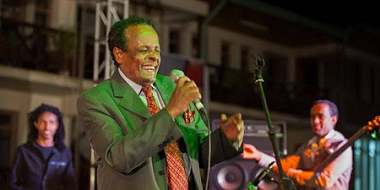
The late Getachew Kassa was one of the prominent vocalists that took center stage in the timeline referred to Ethiopian Golden Age of Music (the 1960th and 1970th). What made him stick out from his contemporaries was his peculiar singing style. He basked under the standing ovation of his fans from three generations.
Last week Getachew passed away aged 79.
In his musical career that stretched for half a century he had played different musical beats along with Fetan Band, Shebele Band and Venus Band and later with Waliya’s band.
He is well remembered for the fast memory–provoking beats. Here it is important to note that memory and music have a deep-seated connection.
Among the cherished songs he played are found “Hageren Atenkuat” (Do not raise my country in bad) , Web Addis Ababa(Mesmeric Addis Ababa), “Tiz Balegn Gize”(When I reminisced),Yekereme fikre(Old flame),Mehede New(I’m due to depart) and Sayesh Esasalehu(I feel pity whenever I see you— the apple of my eye.) These songs, among other songs of his, had won him widespread fame. One of his songs of umbilical cord attachment to one’s motherland runs as follows,
To many of us
A motherland,
Which we call
Our fortress,
Don’t raise the name of
My country in bad!
In Adwa and Maychew
For her sake
The valorous martyred
Kids and elders alike
Got slashed neck;
My country
With citizens
To aggression intolerant
Also if provoked indignant
Let my country from hassle
Take a rest
As it is my nest…
This is one of the best song verses charged with nationalistic sentiment. Despite the passage of time and the coming and departing of generations the song’s acceptability shows an upward swing indicating that it is taken a jewel among such songs of similar nature. In this digital age too it is enjoying a high hit and widespread likes expanding Getachew’s fan base.
Originally the classic song’s verse put above was written in Amharic by the famous author-poet and veteran journalist Abera Lemma. It was written during the counter offensive Ethiopia mounted to reverse Said Bare’s aggression in 1977 G.C.
On a TV interview, an electronic media conducted with Getachew, he was heard mentioning that it was after he saw this poem published on Addis Zemen Newspaper an interest welled up in him to sing the verse asking the permission of the author of the song verse.
With his melodious voice Getachew sang the verse in the best way possible.
Another song of his that won him fame is “Mesmeric Addis Ababa”. It would not be a hyperbole if one claims “it is best of the best songs about Addis. It is unmatched by other songs of similar nature to date.” “Addis Ababa home sweet home” by Alemayehu Eshete is in the same wave length.
Mesmeric Addis my abode
My village Merkato
Where I grew up
My life from toddler
To a grown up
Seared on my heart
And stamped on my being
Trails before my eyes
Everything.
Sheger town
Mesmeric Addis Ababa
Pillar of my love
And upkeep,
Buried in my being deep
Life’s flower
Addis Ababa…
Getachew was born and brought up in Merkato the bustling corner of Addis Ababa. Merkato was once the spawning ground of musicians. It was populated by giant audio-music publishers.
Moreover there were two cinema houses in Merkato namely Ras Theatre and Cinema Ketema where artistic works were staged .As such it was the hub of artists that could wield influence on those that wanted to sniff and follow their footprints. Getachew’s song ‘Mesmeric Addis’ is reflective of tidbits of such memory.
According to studies, Getachew’s paradigm shift on songs revolving around fond memories by changing them from lamentation to ones that evoke the passion of attendees for dance added hues to his fame. He became the talk of the town.
In the Ethiopia Radio’s music buffets conducted as per the choices of the audience. More often than not his name bubbled up to the top. The unfolding facilitated ways for the emergence of Additional publishers such as Kalifa Records that joined the industry publishing Getachew’s songs. Getachew added additional songs foregrounded by Walias band
Following Walia’s band tour abroad, Getachew preferred to seek asylum. Leading a solitary life didn’t deter him from releasing albums packed with mellifluous songs. His dulcet voice synchronizing with his grooving style had helped him to stamp his footprint on Ethiopia’s music history.
Getachew lived in America for 28 years. During his stay there he did stage his works on various podiums. Returning back home he was staging songs in different variety shows and night clubs.
The soft spoken, polite and cordial Getachew is survived by his daughter. His works make a living billboard of his musical knack. Ever since the news of his demise has been heard a cross section of society that cuts a large swath including dignitaries is expressing condolences to the bereaved family members and his fans.
The following comments about the deceased Getachew are excerpts from the Facebook pages of famous artists
“Sadly, Getachew had departed. His songs will go down generation’s lane to echo his fame that arises from his time defying works.”
“His melodic voice is hard to forget.”
“Getachew was not only a vocalist. He was also song verse writer and instrumentalist.”
He was laid to rest in the Holy trinity cemetery after a parting ceremony was conducted to him at the National Theatre in the presence of president of the Ethiopian Musical Society Dawit Yefru who also presided over the committee that saw to the funeral procession.
BY ALEM HAILU G/KRISTOS
THE ETHIOPIAN HERALD WEDNESDAY 28 FEBRUARY 2024





